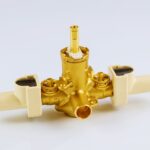Imagine settling down to prepare for your next big catering event, only to be interrupted by an unexpected symphony of strange noises emanating from the refrigerator. Not only is this unsettling, but it also hints at potential disruptions in your upcoming service. Ensuring your refrigeration system functions smoothly is crucial for maintaining the integrity of your ingredients and the efficiency of your kitchen.
- Understand the normal versus problematic noises from your refrigerator to determine when to act.
- Explore practical troubleshooting steps to resolve common noise issues quickly.
- Identify scenarios requiring professional intervention to prevent further complications.
- Adopt preventative maintenance practices to keep your refrigerator operating quietly and efficiently.
By delving deeper into this guide, you’ll gain valuable insights on how to address these concerns and maintain an optimal environment in your kitchen, ensuring peace of mind for every service. Ready to explore the fixes that will bring serenity back to your culinary oasis?
Understanding Why Is My Refrigerator Making Strange Noises and Identifying Them
Refrigerators are essential appliances in both home and commercial kitchens, and while some sounds are perfectly normal, others might be cause for concern. It’s important to recognize the common types of noises that a refrigerator might produce. This knowledge will help you determine whether a particular noise requires further investigation.
Among the most common sounds you may encounter are buzzing, rattling, and humming. Each of these sounds has different potential implications:
- Buzzing: This sound is typically related to the compressor or the ice maker. If your refrigerator has an ice maker and it is not connected to a water supply, the buzzing may indicate that it needs water.
- Rattling: Often caused by items placed too closely against the back of the refrigerator or by the appliance being uneven on the floor.
- Humming: Generally considered normal, as it’s often the sound of the motor fan or compressor running. However, unusually loud humming could mean the motor is working harder than it should, suggesting a need for maintenance.
By understanding these different sounds, you’ll be better equipped to determine whether your refrigerator is functioning as it should or if it needs attention. Identifying these kitchen appliance noises early can aid in maintaining your refrigerator’s efficiency and performance.
Step-by-Step Why Is My Refrigerator Making Strange Noises? Quick Fix Guide for Troubleshooting
When your refrigerator starts making unfamiliar noises, it’s usually a sign that something needs your attention. Follow these step-by-step troubleshooting tips to address the issue effectively:
1. Check the Refrigerator’s Placement: One of the first steps is to ensure that the refrigerator is placed on a flat, stable surface. If it’s not level, it may cause rattling or uneven motor functioning. Use a level to check, and adjust the legs as necessary.
2. Inspect the Area Around Your Refrigerator: External factors often contribute to unexpected noises. Ensure that no items are leaning against the back of the refrigerator and vibrating when the compressor kicks in. Additionally, check that there’s enough clearance around the appliance for proper air circulation.
3. Examine Interior Components: Open the refrigerator and freezer doors, and listen carefully. Sometimes, noises originate from the interior, such as loose shelves or objects inside the refrigerator vibrating. Secure any loose parts and rearrange items if needed to stop the noise.
By following these initial steps, you can address many common refrigerator noises before they lead to more serious issues. Keeping your refrigerator noise-free not only enhances its lifespan but also ensures a peaceful kitchen environment.
Quick Fixes for Common Noises in Refrigerators
Experiencing strange refrigerator noises can be unsettling, but many common issues have simple solutions. Start by investigating the source of the noise, whether it’s a buzzing, humming, or rattling sound.
Securing Loose Parts: One of the most frequent culprits for unusual noises is loose components. Check inside your refrigerator for any parts that seem out of place or wobbly. Gently tighten screws or fittings that have come loose. Pay special attention to the evaporator fan and condenser fan, as these are often the source of noise if unfastened.
Cleaning Dirty Components: Dust and debris can accumulate on the refrigerator’s condenser coils and fan blades, causing them to work harder and produce noise. Unplug your appliance and use a vacuum or a soft brush to clean these components. This not only reduces noise but also enhances the efficiency of your unit, promoting lower energy consumption.
Adjusting the Freezer Fan: If noise seems to emanate from the freezer, it might be due to the freezer fan. Ensure it’s spinning properly and not obstructed by ice buildup or food items. Adjust its positioning if necessary, and remove any ice to maintain a steady airflow.
When to Call a Professional for Your Noises Troubleshooting
While many noise issues can be resolved with simple fixes, some situations require the expertise of a certified technician.
Listen for persistent or particularly loud sounds, such as grinding or squealing, as they may indicate more serious mechanical issues. These noises could point to problems within the compressor or motor, which are crucial to proper refrigerator function.
Another red flag is if noise persists despite thorough troubleshooting. If you’ve attempted to resolve the issue by securing parts, cleaning, and checking for obstructions but the noise remains, professional assessment is warranted.
Additionally, the presence of irregular temperature fluctuations or leaks alongside strange noises suggests malfunctioning components that need expert repair. Seeking professional help not only ensures the longevity of your refrigerator but also prevents potential damage that may lead to costly repairs down the line.
Preventative Measures to Keep Your Refrigerator Noise-Free
Maintaining a quiet refrigerator involves regular upkeep and simple practices that can significantly enhance its performance while preventing unwanted noises. Understanding these preventative steps will help ensure that your appliance functions efficiently and quietly, contributing to a serene kitchen environment.
Start by ensuring that your refrigerator is correctly positioned in your kitchen. Proper placement is crucial as it minimizes vibrations and potential noise. Ensure the appliance is not touching the wall or any kitchen furniture, as this can cause unnecessary noise. Your refrigerator should have ample space around it for ventilation, enhancing its operational efficiency.
Regular cleaning is another vital practice. Dust and dirt accumulate over time on the refrigerator’s condenser coils, which can lead to increased noise levels. Cleaning these coils every six months with a vacuum cleaner or a coil brush can prevent buildup, reduce noise, and improve energy efficiency. Additionally, inspect the refrigerator fan blades periodically for any debris or blockage that might cause humming or buzzing sounds.
Check the refrigerator’s leveling. An uneven refrigerator can cause parts to vibrate excessively, generating noise. Use a spirit level to ensure your fridge’s stability. If it’s not level, adjust the legs accordingly until the refrigerator is even, reducing any vibrations that contribute to noise.
Another useful tip is to inspect the interior components regularly. Ensure that shelves, bins, and drawers are properly secured. Loose parts inside the refrigerator can rattle during operation, so making sure everything is snugly fit will prevent unnecessary noise.
Taking care of door seals is also crucial. Worn or damaged door seals can cause the compressor to work harder, leading to increased noise. Regularly inspect the seals for any signs of wear and tear and replace them if necessary to maintain optimal performance.
Lastly, schedule routine professional maintenance checks. An experienced technician can identify and fix potential issues before they escalate, safeguarding your refrigerator’s efficiency and keeping noise issues at bay.
By incorporating these maintenance practices, you can keep your refrigerator running smoothly and quietly, prolonging its lifespan and ensuring a noise-free atmosphere in your kitchen.
Frequently Asked Questions
What causes a buzzing sound in my refrigerator?
A buzzing sound often comes from the compressor or the fan motor. Ensure they are clean and functioning properly.
Is it normal for my refrigerator to hum?
A gentle hum is normal, indicating the compressor is running. However, a loud hum can signify a problem.
How can I fix a rattling noise?
Rattling may be due to loose parts or the refrigerator not being leveled. Ensure all parts are secure and adjust the leveling as needed.
Why does my fridge make a clicking sound?
A clicking sound is typically the defrost timer or thermostat turning on and off. Frequent or loud clicking should be investigated further.
When should I contact a professional?
If noises persist after troubleshooting or are accompanied by performance issues, it’s best to contact a professional.





